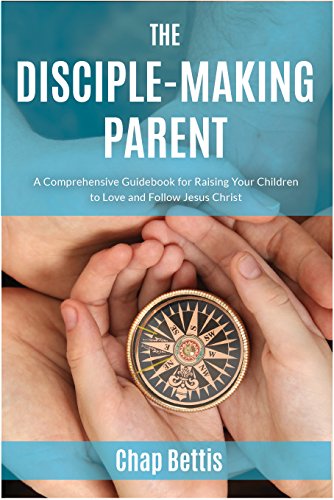Parenting in today’s culture can be exhausting, scary, difficult, challenging and… well, pick your own adjective. Moreover, your desire to raise children as a Christian parent in accordance with the Bible’s truths amplifies those adjectives to an entirely different level. You bring home that beautiful little baby made in the image of God from the hospital, and you look at your spouse and say, “Now what do we do?” That question never goes away for the Christian parent. Your baby grows to become a toddler, a child, a pre-teen and a teenager, and as your baby grows in each of those stages of life, you look at your husband or your wife again to say, “Now what do we do?”
 The Disciple-Making Parent: A Comprehensive Guidebook for Raising Your Children to Love and Follow Jesus Christ (Diamond Hill Publishing, 2016) seeks to help us answer that kind of question. In it, author Chap Bettis aims to equip you to “disciple your children” and “to help you on your parenting journey” (xiii–xiv). This article will provide you with a brief summary of the material, a critical review of the contents and a concluding recommendation. Before I begin, I would like to acknowledge that this book is for all Christian parents who desire to raise their children in the “discipline and instruction of the Lord” (Eph. 6:4). If you are a single parent, a parent with an unbelieving spouse or a parent with a believing spouse, this book is intended for you.
The Disciple-Making Parent: A Comprehensive Guidebook for Raising Your Children to Love and Follow Jesus Christ (Diamond Hill Publishing, 2016) seeks to help us answer that kind of question. In it, author Chap Bettis aims to equip you to “disciple your children” and “to help you on your parenting journey” (xiii–xiv). This article will provide you with a brief summary of the material, a critical review of the contents and a concluding recommendation. Before I begin, I would like to acknowledge that this book is for all Christian parents who desire to raise their children in the “discipline and instruction of the Lord” (Eph. 6:4). If you are a single parent, a parent with an unbelieving spouse or a parent with a believing spouse, this book is intended for you.
Your life either commends or condemns the gospel.
Summary of Contents
Bettis divides this book into three parts. In part one the author begins with the parents’ responsibility to understand the Great Commission as the “foundational parenting text” (6). Bettis rightly explains that God has designed parents to be primarily responsible for their child’s spirituality. He writes, “Though the family is not the exclusive means of discipleship, it is meant to be the primary one” (15). He then helps the Christian parent understand the challenges and changes their child will experience throughout their lives.
Part two contains the bulk of the material for how to be a disciple-making parent. The author begins with our example as parents. Parents will either display the gospel of Jesus Christ poorly or well to their children. “Your life either commends or condemns the gospel,” Bettis writes (39). In addition, children need to be connected to “other godly examples” (56), and he provides a powerful paradigm for the parenting cycle as our children mature. Your parenting changes from authority to influence as your children grow (99).
Bettis spends two chapters expounding upon “skillful communication” (101–117). And he spends an equally large portion of his work helping the Christian parent acknowledge the central role of Scripture in the home. “It is not knowledge of the Scriptures that matters, it is knowledge with a goal: to know Jesus Christ,” Bettis rightly states (132). The author builds part two around the theme of making your child a disciple. “Your child is made to live for this purpose,” Bettis argues, “battling real spiritual enemies and living a life of kingdom expansion” (167). The author concludes with an emphasis on prayer from an individual, married, family and corporate perspective.
Part three prepares parents for the doubts and worldly influences that will seek to detract from the child’s biblical teaching. Doubts and outside influences are real issues that our children will face in the world. Doubts arise in our children as they experience worldly influences “because the Christian life is the only life [they] have ever known” (210). Friendship and media use are addressed because both of these influencers have the ability to tempt our child away from biblical truths. Bettis concludes that our task is a means to teach our children how to rely on and continue to grow in their relationship with Christ through the power of the Holy Spirit.
Critical Review
Bettis achieves his intended purpose of being “a guidebook” for the Christian parent trying to answer the question, “Now what do I do?” He grounds his parenting principles in a theological system. The doctrine of God, the church, Christ, salvation and the Holy Spirit provide the foundation for his proposed parenting techniques. For example, Bettis states from the start that “our job is to discharge faithfully the duties God has given to us, leaving the results in God’s hands” (20). The author means that we are responsible for the parenting of our children, but that is our only responsibility. The salvation and development of our child’s spiritual lives are between the Lord and the child.
Additionally, this book is filled with biblically based practical tips and examples on how to be an effective Christian parent. Bettis starts each chapter with a theological idea, and concludes the chapter with applications and review questions to think through and discuss. For instance, after teaching the reader the value of staying connected to your child’s heart through proper communication, Bettis provides the reader with sample questions to “open up your child’s heart” (109). The practical tips and examples he provides give the reader a starting point for their own parenting style.
Bettis discusses a few topics that do not get as much attention in today’s parenting literature — such as the need for a local church, friends and media. The idea that we can parent our child without the local church seems to be growing in today’s individualistic society. Bettis combats this claim by writing, “God has placed men and women into the body of Christ to contribute to your child as he or she grows older” (59). We should be conscientious in our individualistic culture to rely on the local church to help in the spiritual development of our child.
The need to encourage and guide our child into “gospel friendships” will be eye-opening to many Christian parents (230). Additionally, many parents will be grateful for his wisdom about their children and media. Bettis provides helpful insight on the goodness and the cautions Christian parents should use with their child’s media usage and friendships.
Two cautions to consider before reading this book. First, the author calls this work a “comprehensive” guidebook for the Christian parent. The word “comprehensive” in the title might falsely insinuate that this guidebook has all the answers, methods and techniques for parenting your child effectively. The word “comprehensive” identifies something as being complete. For those of you with multiple children in the home, you will learn quickly that your children are vastly different. Certain practices that work on one of your children may not work on the other and vice versa. There is no one-size-fits-all approach to parenting.
While the Bible has only one correct meaning or interpretation, there are endless applications. Bettis admits as much when he writes sentences like, “If you do not like the candy motivator, then come up with your own system” (160). Christian parents must take the principles discussed in this book, think through the guidance given by the author, and then adapt those principles into the context of their own home. For example, a husband and wife will apply these principles differently than a single mother or father. You need to use biblical wisdom in how you use this information in the context of your home in order to disciple your child faithfully.
Second, the book is about parenting, but for those that are married, parenting must be conducted within the biblical framework of the marriage relationship. Bettis skims this subject in chapter five titled, “Loving Your Spouse and Liking Your Children.” The bulk of this chapter focuses on the “Liking Your Children” phrase. Notably, the chapter briefly covers the, “Loving Your Spouse” phrase. The author might have further emphasized the covenantal nature of marriage and the temporal nature of child rearing. For instance, God created the marriage relationship before he created the parent/child relationship (Gen. 3:18). Why? The foundational building block of all society begins and is built upon the husband and wife relationship.
When we underemphasize the covenant of marriage, we can inadvertently downplay God’s design for the family. The best thing a parent can do is love their spouse more than their child, and by loving their spouse more than their child, the child will have more stability. After your relationship with Christ, the marriage relationship exists as the first priority relationship in the home, and the parent-to-child relationship comes second. Your priority to your spouse should feed the second priority of your parenting.
Conclusion
As a father of four children, my wife and I continually ask each other the question, “Now what do we do?” The strengths of this book outweigh any of the humble critiques I have provided for you. This book ranks as a top contender for a book that every parent should read as they seek to honor Christ by parenting their children faithfully.
You will read this book and be convicted that you need to do better at making a disciple of your child. That’s a good thing. We all need to be convicted that we should take our God-given task more seriously and faithfully. With The Disciple-Making Parent, you will be better equipped to answer the question, “Now what do we do?”




Comments and Pingbacks
2019-04-04 08:20:38
Susan Johnson
Excellent books to follow with this that discuss covenant marriage and parenting are by Gary Thomas: Sacred Marriage and Sacred Parenting
2019-06-02 11:16:30
Todd Johnson
One question I have is, how much is he focused on the great commission, making disciples of unreached parts of the world, and evangelism? Is there any focus on loving your enemy, blessing those who curse you, verses that involve "hating your family ", "carrying your cross", and " counting the cost ". There are very difficult passages in the Scriptures that are part of our ultimate discipleship. We are to go just as Jesus did, we are actually also called to suffer for the gospel, and while that may not mean physical suffering, imprisonment, etc., it does imply there is a cost of following Jesus Christ. So is this more about engineering the Christian faith, or does he touch on the core elements of the faith which include the great commission, through the spirit, and making disciples of every nation, tribe, and time.? Thank you,